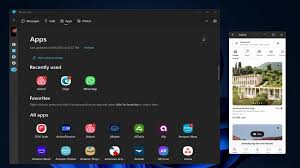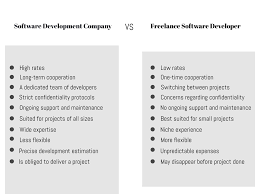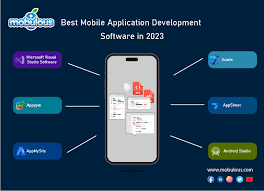Exploring the Evolution of Mobile App Development Software: Innovations and Trends
The Evolution of Mobile App Development Software
In today’s digital age, mobile applications have become an integral part of our daily lives. From social networking to e-commerce, mobile apps cater to a wide range of needs and interests. Behind the scenes of these innovative apps lies a crucial component: mobile app development software.
Mobile app development software enables developers to create, test, and deploy mobile applications across various platforms such as iOS and Android. Over the years, this software has evolved significantly to meet the growing demands of the industry.
Key Features of Modern Mobile App Development Software:
- Cross-Platform Development: Many modern tools support cross-platform development, allowing developers to write code once and deploy it on multiple platforms.
- User Interface Design: Intuitive interfaces and drag-and-drop features make it easier for developers to design visually appealing apps.
- Integration Capabilities: Seamless integration with third-party services and APIs streamlines the development process.
- Real-Time Testing: Built-in testing tools enable developers to test their apps in real-time on different devices and screen sizes.
- Analytics and Monitoring: Tools that provide insights into user behavior and app performance help developers optimize their apps for better user engagement.
The Future of Mobile App Development Software:
As technology continues to advance, we can expect mobile app development software to become even more sophisticated. Artificial intelligence, machine learning, and automation are likely to play a significant role in streamlining the app development process.
In conclusion, mobile app development software has revolutionized the way we interact with technology. It empowers developers to bring their ideas to life and create impactful applications that enhance our digital experiences. With continuous innovation in this field, the future looks bright for mobile app development software.
Top 9 FAQs About Mobile App Development Software: Features, Types, and Trends
- What is mobile app development software?
- What are the key features of mobile app development software?
- How does mobile app development software help developers?
- What are the different types of mobile app development software available?
- Is mobile app development software easy to use for beginners?
- Can mobile app development software support cross-platform development?
- Are there free options for mobile app development software?
- How important is user interface design in mobile app development software?
- What trends are shaping the future of mobile app development software?
What is mobile app development software?
Mobile app development software refers to a set of tools, frameworks, and platforms that enable developers to create mobile applications for various operating systems such as iOS and Android. This software provides developers with the necessary resources to design, build, test, and deploy mobile apps efficiently. By utilizing mobile app development software, developers can streamline the development process, optimize app performance, and ensure compatibility across different devices. In essence, mobile app development software serves as a comprehensive solution that empowers developers to bring their app ideas to life and deliver engaging experiences to users on smartphones and tablets.
What are the key features of mobile app development software?
When it comes to mobile app development software, understanding its key features is essential for developers looking to create successful applications. Some of the key features include cross-platform development capabilities, user-friendly interface design tools, seamless integration with third-party services, real-time testing functionalities for various devices, and analytics tools for monitoring user behavior and app performance. These features not only streamline the development process but also contribute to creating high-quality mobile applications that meet user expectations and drive engagement.
How does mobile app development software help developers?
Mobile app development software plays a crucial role in assisting developers throughout the app creation process. It provides a comprehensive set of tools and features that streamline development tasks, such as coding, testing, and deployment. By offering intuitive user interfaces, cross-platform capabilities, real-time testing environments, and integration with third-party services, mobile app development software significantly simplifies the complex process of building mobile applications. Additionally, these tools often include analytics and monitoring features that help developers track user behavior and optimize app performance. Overall, mobile app development software empowers developers to bring their ideas to life efficiently and create high-quality applications that meet the demands of today’s digital landscape.
What are the different types of mobile app development software available?
When it comes to mobile app development software, there are various types available to cater to the diverse needs of developers. Some popular categories include integrated development environments (IDEs) like Android Studio and Xcode, which provide comprehensive tools for building native apps. Cross-platform development tools such as React Native and Xamarin allow developers to write code once and deploy it across multiple platforms. Low-code/no-code platforms like Appgyver and OutSystems enable rapid app development with minimal coding knowledge. Additionally, cloud-based app development platforms such as AWS Amplify and Firebase offer scalable infrastructure and services for building robust mobile applications. Each type of mobile app development software has its unique features and advantages, empowering developers to choose the best tool for their specific project requirements.
Is mobile app development software easy to use for beginners?
When it comes to the question of whether mobile app development software is easy to use for beginners, the answer largely depends on the specific tools and platforms being utilized. While some mobile app development software offers user-friendly interfaces and intuitive features that cater to beginners, others may have a steeper learning curve. However, with the abundance of resources such as tutorials, online courses, and community support available today, beginners can gradually familiarize themselves with mobile app development software and gain the necessary skills to create their own applications. Patience, dedication, and a willingness to learn are key factors in overcoming any initial challenges that beginners may encounter in their journey towards mastering mobile app development software.
Can mobile app development software support cross-platform development?
Mobile app development software has evolved to support cross-platform development, allowing developers to write code once and deploy it across multiple platforms such as iOS and Android. This feature enables developers to streamline the development process, saving time and effort by eliminating the need to create separate code bases for each platform. With cross-platform development capabilities, developers can reach a wider audience and ensure a consistent user experience across different devices, making it a valuable feature in modern mobile app development software.
Are there free options for mobile app development software?
When it comes to mobile app development software, one frequently asked question is whether there are free options available. The answer is yes, there are free options for mobile app development software that cater to developers looking to create apps without incurring costs. These free tools often provide basic functionalities for designing, testing, and deploying mobile applications. While they may have limitations compared to paid software in terms of features and support, they can still be a great starting point for beginners or those on a tight budget. Developers can explore these free options to gain hands-on experience in app development before considering more advanced or premium solutions.
How important is user interface design in mobile app development software?
User interface design plays a crucial role in mobile app development software as it directly impacts the user experience and overall success of an app. A well-designed user interface not only enhances the visual appeal of the app but also ensures ease of navigation and interaction for users. Intuitive design elements, clear layouts, and seamless user flows contribute to increased user engagement and satisfaction. In today’s competitive app market, where user expectations are high, prioritizing user interface design in mobile app development software is essential for creating apps that stand out and resonate with users.
What trends are shaping the future of mobile app development software?
In the dynamic landscape of mobile app development software, several key trends are shaping the future of this industry. From the rise of low-code and no-code platforms that empower non-technical users to create apps, to the increasing emphasis on security and data privacy in response to growing cyber threats, the evolution of mobile app development software is driven by a combination of technological advancements and user demands. Additionally, the integration of artificial intelligence and machine learning capabilities into development tools is revolutionizing how apps are built and optimized for user engagement. As mobile devices continue to proliferate and user expectations evolve, staying abreast of these trends will be essential for developers looking to create innovative and successful mobile applications.








